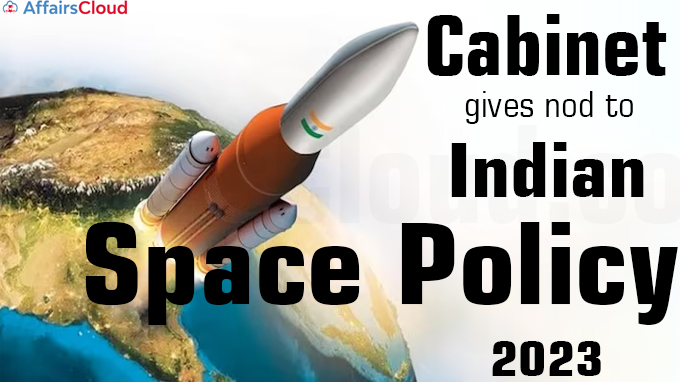 The Union Cabinet chaired by the Prime Minister (PM) Narendra Modi has approved the following proposals:
The Union Cabinet chaired by the Prime Minister (PM) Narendra Modi has approved the following proposals:
i.Indian Space Policy 2023 to enable the private sector to participate in various space activities
ii.Revised Domestic Gas Pricing Guidelines
iii.Army proposal to induct woman officers in Artillery
Cabinet gives nod to Indian Space Policy, 2023
The Cabinet Committee on Security (CCS) chaired by the Prime Minister (PM) Narendra Modi has approved the Indian Space Policy 2023 that will enable the private sector to participate in various space activities, such as constructing satellites, rockets, and launch vehicles, as well as collecting and sharing data.
Aim:
To boost India’s space department’s role and give a larger participation to research, academia, startups, and industry
Highlights:
i.This policy delineated the roles and responsibilities of Indian Space Research Organisation (ISRO), space sector PSU (Public Sector Undertaking) NewSpace India Limited (NSIL), and Indian National Space Promotion and Authorization Center (IN-SPACe).
- NSIL will carry out strategic activities related to the space sector i.e. operational part of ISRO’s missions will be moved to NSIL.
- The INSPACe will be the interface between ISRO and non-governmental entities.
- ISRO will not do any operational and production work for the space sector and will focus on developing new technologies, new systems and research and development.
ii.The policy also create a framework for the private sector to use ISRO facilities for a small charge and encourages them to invest in creating new infrastructure for the sector.
iii.Currently, India’s share in the global space economy is below 2%, but the space policy is expected to significantly boost it to 10% in the future.
iv.The policy will establish a strong foundation for private sector companies and startups to provide a variety of space-based services, including launching satellites and offering convenient services to citizens to enhance their quality of life.
Cabinet approves revised Domestic Gas Pricing Guidelines
The Cabinet Committee on Economic Affairs (CCEA), chaired by PM Narendra Modi has approved a mechanism to fix pricing for domestic natural gas in India. It has revised domestic natural gas pricing guidelines for gas produced from nomination fields of Oil and Natural Gas Corporation (ONGC)/Oil India Limited(OIL), New Exploration Licensing Policy (NELP) blocks and pre-NELP blocks, where Production Sharing Contract (PSC) provides for Government’s approval of prices.
- The new mechanism will adopt the key recommendations made by the Kirit Parikh Panel, set to decide the deregulation of gas prices in India.
Note: Gas produced from new wells or well interventions in the nomination fields of ONGC & OIL, would be allowed a premium of 20% over the Administered Price Mechanism (APM) price.
Aim:
To establish a pricing system for domestic gas consumers that is stable, while also offering sufficient protection to producers against negative market fluctuations, along with incentives to encourage increased production.
What is the mechanism?
The domestic gas pricing will now be linked to imported crude pricing and would be decided at 10 percent of the Indian crude basket and will be revised on a monthly basis.
Current Scenario:
Currently, the domestic gas prices are determined as per the new Domestic Gas Pricing Guidelines, 2014 which were approved by Government in 2014. Under this, gas prices are decided on a 6-monthly basis and based on the volume-weighted prices prevailing at four gas trading hubs – Henry Hub, Albena, National Balancing Point (UK), and Russia for a period of 12 months and with a time lag of a quarter.
Key Points:
i.The above decision is part of the Central Government’s reforms that will lead to significant decrease in prices of Piped Natural Gas (PNG) for households and Compressed Natural Gas (CNG) for transport. The reduced prices will also lower the fertilizer subsidy burden and help the domestic power sector.
ii.Government has targeted to increase the share of natural gas in primary energy mix in India from current 6.5% to 15% by 2030.
Govt approves Army proposal to induct woman officers in Artillery
In March 2023, the Central Government has approved the Indian Army’s decision to induct women officers in the artillery regiments. In this regard, the first lot of women will be commissioned in the Army’s artillery regiments by the end of April 2023 when they pass out of the Officers’ Training Academy (OTA), Chennai, Tamil Nadu.
- This will be the first time that women will be trained to use howitzers and rocket systems.
Note: On March 1, 2023, GoI also approved the induction of woman officers in the Remount and Veterinary Corps.
Key Points:
i.Women officers are currently flying fighter planes in the Indian Air Force (IAF) and serving on ships in the Indian Navy.
ii.The artillery is a branch of land-based forces responsible for operating large guns and engaging enemies from a distance.
- It is the second largest branch after infantry and consists of various regiments that use guns of different calibers, surface-to-surface and surface-to-air missiles, mortars, and unmanned aerial vehicles.
iii.As per data shared by the government on March 17, 6,993 women officers were currently serving in the Army. This number includes female officers serving in the Army Medical Corps, Army Dental Corps, and Military Nursing Service.
Recent Related News:
i.The Cabinet has approved the signing of MoU between GoI and Chile for cooperation in the field of Agriculture and Allied sectors. This MoU will remain in force for 5 years which will be automatically renewed for a further period of 5 years.
ii.The Union Cabinet has also approved the strengthening cooperative movement in India and deepening its reach up to the grassroots. In this regard, Ministry of Cooperation (MoC) has formulated a plan to establish 2 lakh Primary Agriculture Credit Societies (PACS) in uncovered villages/panchayats, and viable fishery cooperatives in each coastal Panchayat/village as well as Panchayat/village having large water bodies over the next 5 years.
About Indian Space Research Organisation (ISRO):
Chairman – S. Somanath
Headquarters– Bengaluru, Karnataka
Establishment– 1969




